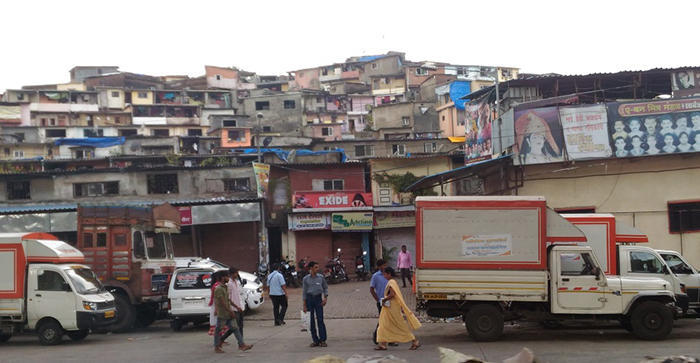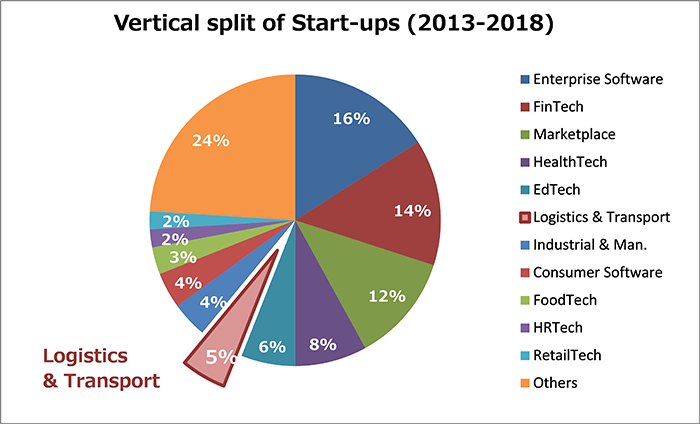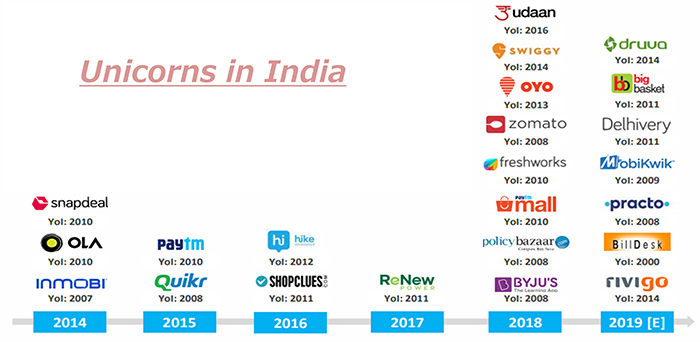Indian Unicorn start-up companies in logistics
March 10, 2020

India is the 3rd largest start-up ecosystem in the world, with about 7,500 startups incepted in 2013-2018. By industry, Enterprise Software is the highest with 16%, followed by FinTech 14%, Marketplace 12%, etc. Logistics & Transport comes in 6th with 5% share. Logistics & Transport start-ups provide logistics services and supply chain management, e.g. logistics and distribution platform, fleet management, warehousing, IoT platform for logistics, IoT platform for goods transportation marketplace, etc.

Source: NASSCOM "INDIAN TECH START-UP ECOSYSTEM 2018: Approaching Escape Velocity"
(https://www.nasscom.in/)
A Unicorn is a privately held unlisted start-up company valued at over $1 billion. The number of Unicorns in India was 18, with 8 Unicorns newly added in 2018. India comes in 3rd after the U.S. and China regarding the Unicorn ecosystem. By 2020, more than 10 startups are expected to be added to the Indian unicorn list.

Source: NASSCOM "INDIAN TECH START-UP ECOSYSTEM 2018: Approaching Escape Velocity"
(https://www.nasscom.in/)

Note: YOI refers to Year of Inception
Source: NASSCOM "INDIAN TECH START-UP ECOSYSTEM 2018: Approaching Escape Velocity"
(https://www.nasscom.in/)
An Indian start-up company provides last mile delivery service for e-commerce companies. It was originally established in 2 cities, and delivered around 500 shipments per day, but has since grown rapidly with the fast-expanding e-commerce market in India. As of 2019, it covers more than 2,500 cities across India and has more than 14,000 vehicles. With these, approximately one million shipments are delivered each day. Until now, a total of 600 million deliveries were achieved. Customers include major Indian e-commerce sites such as Amazon India, FlipKart, and Paytm Mall. Currently, in addition to e-commerce parcel services, business diversification is being carried out, such as full-truck or partial-truckload services, supply chain logistics and e-commerce logistics services, making the company one of the largest supply chain service providers in India.
"Speed" seems to be the key to the company's success. Delivery times are important not only to buyers, but also to sellers. Searching, analysing, and visualising millions of data points collected daily from the network are important to quickly identify and mitigate network bottlenecks, maintain high levels of transportation efficiency, and improve delivery speed.
Another logistics start-up company provides long-distance transportation between cities. The company calls it "Relay Trucking" in light of concerns that there will be a shortage of truck drivers in the future; as the economy grows, it is expected to require one million drivers each year for the next 10 years. This company is improving transportation efficiency with this new relay system.
"Relay Trucking" is a relay system that switches trucks at a transfer point called "relay pit-stops" every time a driver travels several hundred kilometres. There is a similar initiative in Japan, and this will allow drivers to return home every day without traveling long distances, improving drivers' working conditions and eventually securing drivers. The company puts the word "Making logistics human" on its website, and it is not only improving the drivers' working system that makes it difficult to return home, but also providing support for driving safety, health and finance (including mortgages and scholarships). Thus, the company is working to improve the lives of drivers. "Relay Trucking" not only improves the driver's living environment, but also reduces transit time by 50-70%; therefore customers may benefit from reducing inventory costs and storage space, and speeding the time before reaching the market.
In India, while there are many business opportunities such as strong economic growth of 6.8% in 2018, relatively young population, high internet penetration, and rapid growth of the e-commerce market, the level of delivery infrastructure is relatively low, which is something unique to emerging countries. In particular, there is still a problem in the "last mile" distribution to the final destination, such as traffic congestion and air pollution problems in large cities and distribution networks in small cities and rural areas. It is said that 15% of deliveries by last-mile logistics companies in India is not delivered because of unsuccessful receiving due to some reasons.
In India, where the last mile transportation network is not necessarily fully developed, start-up companies take a fast-paced business strategy, such as providing a platform that uses IT technology and matches individual drivers and customers. This has helped to improve inefficiencies and meet the needs of both customers and sellers, and have grown themselves. In addition to improving transportation efficiency, there is a start-up company that focuses on making truck driver occupation more attractive and human-like, and this is going to be crucial for stable transportation and logistics in India in the future. Would you believe that innovation in the world, including India, is born from start-up companies?
Reference:
- NASSCOM: INDIAN TECH START-UP ECOSYSTEM 2018: Approaching Escape Velocity
https://www.nasscom.in/ - NRIC Logitan Hauptbahnhof (in Japanese)
https://blog.nittsu-soken.co.jp/logistics/2017_11_20_02